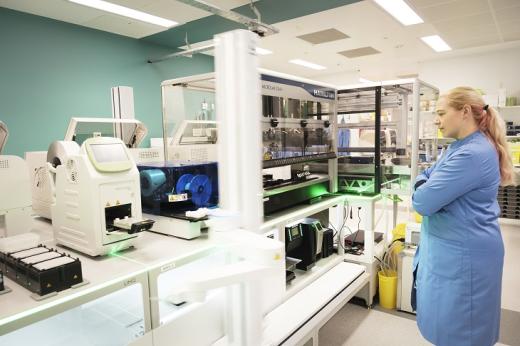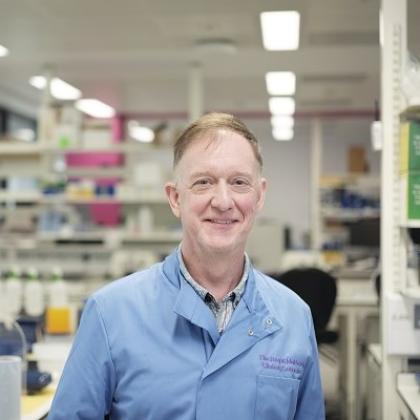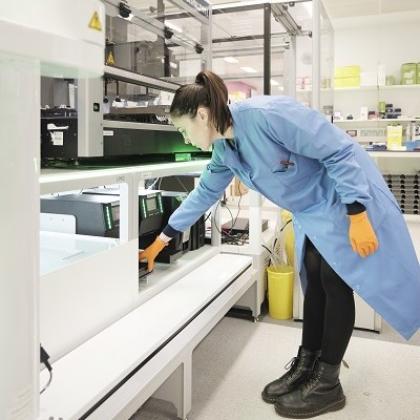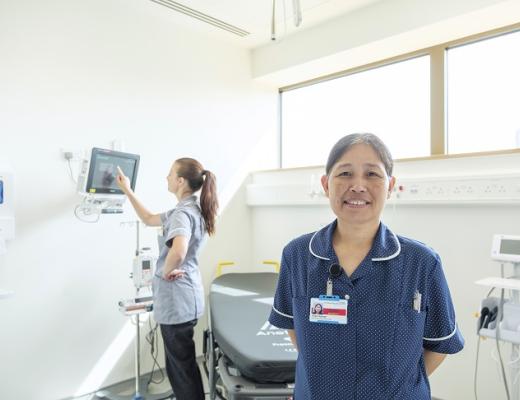Groundbreaking robotic technology is helping to diagnose and treat cancer patients at The Royal Marsden and beyond
More patients will now benefit from increased access to genomic testing – helping to identify potential risk of cancer, diagnose the disease and personalise treatment.
The first robotic genomic testing lab for cancer patients in the UK has launched, following a partnership between The Royal Marsden and Automata Technologies – a leading automation company.
Based in the National Institute for Health and Care (NIHR) Centre for Molecular Pathology (CMP) at The Royal Marsden, this will double the hospital’s genomic testing capacity and expand the range of tests it can perform in its existing laboratory space.

What is genomic testing?
Cancer is often a disease of genetic changes. By analysing a patient’s DNA, researchers can better understand the cause of the cancer, which can lead to a more personalised diagnosis and approach to treatment. Genomic testing can also help identify genetic changes inherited from a parent.
What does the robotic technology do?
The process of preparing samples of saliva, blood, bone marrow and tissue, to be examined by scientists, will now be automated. This means it will be carried out robotically.
This will be done through Automata’s LINQ platform, a ‘smart’ laboratory bench that connects equipment using robotic and digital technology. With six robotic arms, the installation will substantially increase the samples being processed, without affecting accuracy, benefiting patients at The Royal Marsden and elsewhere in the UK.

“The robots are flexible, efficient and fun to work with!”
“Over 90% of our genomics samples will pass through the new automated laboratory, which blends new and existing equipment to make the best use of space,” says Professor Michael Hubank, Scientific Director of Clinical Genomics at The Royal Marsden NHS Foundation Trust and Professor of Translational Genomics at The Institute of Cancer Research, London.

“Our highly qualified laboratory staff are delighted with the facility which has freed them up from repetitive and time-consuming tasks. The robots are flexible, efficient and fun to work with too. Excitingly, this system also has the potential to one day reduce costs and turnaround times which will benefit patients and the wider NHS. We are incredibly excited to be the first laboratory in the country to use this technology for genomic cancer testing and look forward to further developments in the future.”
Transforming cancer testing and research
There are also other benefits of the new Automata technology:
- Personalised cancer treatment – The Royal Marsden will be able to process more somatic tests. This form of genomic testing identifies genetic changes in cancer cells that drive tumour growth and provides a target for personalised cancer treatment. This is particularly important because The Royal Marsden is the cancer testing laboratory for the North Thames Genomics Laboratory Hub – one of seven hubs in England. This means it provides somatic testing for North London, Hertfordshire and Mid and South Essex.

- Identifying risk and the right treatments – with increased capacity thanks to automation, the hospital will also be able to launch new genetic – or cancer germline – testing. This identifies inherited genetic changes that can increase risk of cancer and, for patients who have cancer, it can also be used to identify the right treatments. It will mainly test for mutations in the BRCA genes, which can impact the risk of various cancers including breast and ovarian.
- Supporting research into genetics and cancer, like the BRCA-Direct study. This project is aiming to boost BRCA gene testing access for breast cancer patients and their family members by using saliva rather than blood tests, which are less invasive and can be done at home. The study is led by Dr Clare Turnbull, Professor of Translational Cancer Genetics at the ICR and Consultant in Clinical Cancer Genetics at The Royal Marsden.
With your help, we can continue to invest in new technology to improve diagnosis and treatment for people with cancer
The NIHR Centre for Molecular Pathology (CMP) at The Royal Marsden is supported by funding from the National Institute for Health Research Biomedical Research Centre at The Royal Marsden and The Institute of Cancer Research, London, and The Royal Marsden Cancer Charity.
Thanks to supporters like you, we can develop new, more effective ways of identifying, diagnosing and treating cancer – improving the lives of cancer patients now and into the future.
Find out more about ways you can support us.
Read more stories on our blog.


